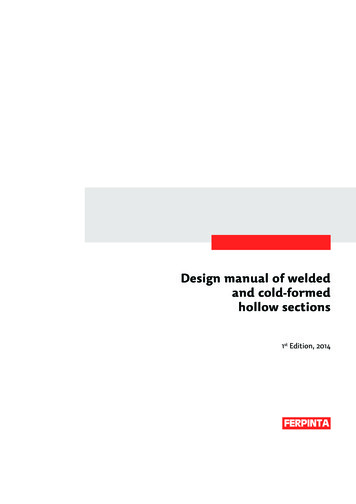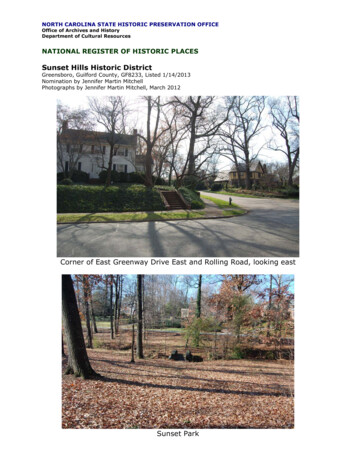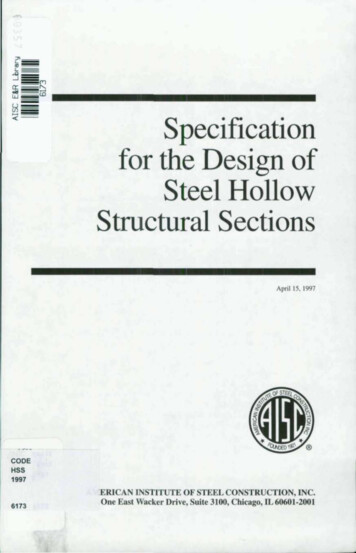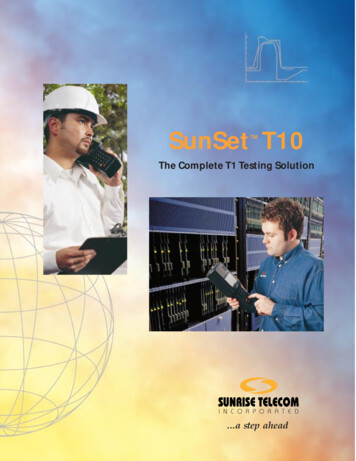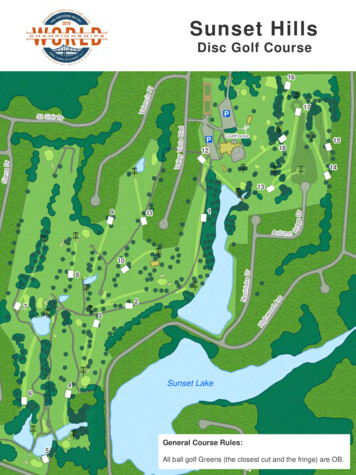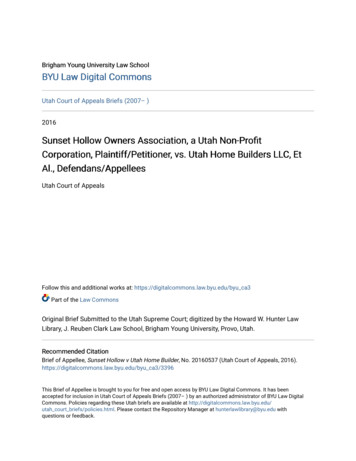
Transcription
Brigham Young University Law SchoolBYU Law Digital CommonsUtah Court of Appeals Briefs (2007– )2016Sunset Hollow Owners Association, a Utah Non-ProfitCorporation, Plaintiff/Petitioner, vs. Utah Home Builders LLC, EtAl., Defendans/AppelleesUtah Court of AppealsFollow this and additional works at: https://digitalcommons.law.byu.edu/byu ca3Part of the Law CommonsOriginal Brief Submitted to the Utah Supreme Court; digitized by the Howard W. Hunter LawLibrary, J. Reuben Clark Law School, Brigham Young University, Provo, Utah.Recommended CitationBrief of Appellee, Sunset Hollow v Utah Home Builder, No. 20160537 (Utah Court of Appeals, 2016).https://digitalcommons.law.byu.edu/byu ca3/3396This Brief of Appellee is brought to you for free and open access by BYU Law Digital Commons. It has beenaccepted for inclusion in Utah Court of Appeals Briefs (2007– ) by an authorized administrator of BYU Law DigitalCommons. Policies regarding these Utah briefs are available at http://digitalcommons.law.byu.edu/utah court briefs/policies.html. Please contact the Repository Manager at hunterlawlibrary@byu.edu withquestions or feedback.
No. 20160537-CAIN THE UTAH COURT OF APPEALSSUNSET HOLLOW OWNERS ASSOCIATIONPlaintiff and Appellant,v.UTAH HOME BUILDERS LLC, ET AL.,Defendants and AppelleesBRIEF OF APPELLEE UTAH HOME BUILDERS, LLC[PUBLIC]On appeal from the Fourth Judicial District Court, Utah County,Honorable Fred D. Howard, District Court No.14041530Phillip E. JosephRobert W. WilkinsonMatt WinnBall Janik LLP101 SW Main Street, Suite 1100Portland, OR 97204-3219Tel.: anik.commwinn@balljanik.comAttorneys for AppellantMichael D. Johnston (11273 )Justin W Starr (10708)KIRTON McCONKIE P.C.50 E. South Temple, 4th FloorSalt Lake City, Utah 84111Tel.: (801) neys for Appellee, UtahHome Builders, LLCFILEDUTAH APPELLATE COURTSDEC 2 2 201b
Patrick C. Burt (11138)S. Shane Stroud (15266)Chelsey Phippen (13333)KIPP & CHRISTIAN, P.C.10 Exchange Place, Fourth FloorSalt Lake City, Utah 84111Tel.: (801) hristian.comcphippen@kippandchristian.comii
No. 20160537-CAIN THE UTAH COURT OF APPEALSSUNSET HOLLOW OWNERS ASSOCIATIONPlaintiff and Appellant,v.UTAH HOME BUILDERS LLC, ET AL.,Defendants and AppelleesBRIEF OF APPELLEE UTAH HOME BUILDERS, LLC[PUBLIC]On appeal from the Fourth Judicial District Court, Utah County,Honorable Fred D. Howard, District Court No.14041530Phillip E. JosephRobert W. WilkinsonMatt WinnBall Janik LLP101 SW Main Street, Suite 1100Portland, OR 97204-3219Tel.: anik.commwinn@balljanik.comAttorneys for AppellantMichael D. Johnston (11273 )Justin W Starr (10708)KIRTON McCONKIE P.C.50 E. South Temple, 4th FloorSalt Lake City, Utah 84111Tel.: (801) neys for Appellee, UtahHome Builders, LLC
Patrick C. Burt (11138)S. Shane Stroud (15266)Chelsey Phippen (13333)KIPP & CHRISTIAN, P.C.10 Exchange Place, Fourth FloorSalt Lake City, Utah 84111Tel.: (801) hristian.comcphippen@kippandchristian.comii
TABLE OF CONTENTS TABLE OF AUTHORITIES . VINTRODUCTION. 1STATEMENT OF JURISDICTION . 4i.ilISSUES PRESENTED . 4STATEMENT OF THE CASE . 5STATEMENT OF FACTS . 7SUMMARY OF ARGUMENTS . 91. Did the district court err in holding that Plaintiff's UCSPA claimagainst UHB were preempted by the Construction Defect Statutes? . 92. Did the district court err in holding that the economic loss rule barsPlaintiff's claims against UHB? . 10ARGUMENT . 10I.THE DISTRICT COURT PROPERLY DISMISSED THE ASSOCIATION'S UCSPACLAIM . 11A. The Association's UCSP A Claim is Preempted by theConstruction Defect Statutes . 11B. In the Alternative, the Association's UCSPA Claim Fails becausethe Association Did Not Engage in a Consumer Transaction withUHB . 18C. In the Alternative, the Association's UCSPA Claim Fails becausethe Association Did Not Plead Intent as is Required to Maintain aUCSPA Claim . 19D. In the Alternative, the Association's UCSPA Claim Fails becauseIt Did Not Plead the Claim with Particularity . 20ILTHE ASSOCIATION'S EQUITABLE SUBROGATION CLAIM IS BARRED BY THECONSTRUCTION DEFECT STATUTES . 22iii
A. The Association Does Not Present any Viable Cause(s) of Actionthat the Homeowners Can Pursue against UHB for DefectiveConstruction. 23B. The Association's Equitable Subrogation Claim Violates theExpress Terms of UTAH CODE§ 78B-4-513 . 24CONCLUSION . 26CERTIFICATE OF COMPLIANCE . 27CERTIFICATE OF SERVICE . 28iv,
TABLE OF AUTHORITIES CASESBakowski v. Mountain States Steel, Inc.,2002 UT 62 . 24Berneike v. Citimortgage, Inc.,708 F.3d 1141 (10th Cir. 2013) . 13Burke v. Burke,733 P.2d 498 (Utah 1986) . 2Burnett v. Mortgage Elec. Registration Sys., Inc.,706 F.3d 1231 (10th Cir. 2013) . 12Burnett v. Mortgage Elec. Registrations Sys., Inc.,2009 WL 3582294 (D. Utah Oct. 27, 2009) . 13, 14Carlie v. Morgan,· 922 P.2d 1 (Utah 1996) . 12, 13Colores v. Sabey,2003 UT A pp 339 . 21Davencourt at Pilgrims Landing Homeowners Ass'n v. Davencourt atPilgrims Landing, LC,2009 UT 65 . 17, 18Estrada v. Mendoza,2012 UT App 82 (Utah App. 2012) . 19V
Kee v. R-G Crown Bank,656 F. Supp. 2d 1348 (D. Utah 2009) . 20Martinez v. Best Buy Co., Inc.,2012 UT App 186 . 20McGinnis v. GMAC Mortgage Corp.,2010 WL 3418204 (D. Utah Aug. 27, 2010) . 14Rawson v. Conover,2001 UT 24 . 20Reed v. AFNI, Inc.,2011 WL 112430 (D. Utah Jan. 13, 2011) . 20Russell v. Standard Corp.,898 P.2d 263 (Utah 1995) . 4Shah v. Intermountain Healthcare, Inc.,2013 UT App 261 . 19State ex rel. Div. of Consumer Prat. v. GAF Corp.,760 P.2d 310 (Utah 1988) . 20Thomas v. Wells Fargo Bank, N.A.,2014 WL 657394 (D. Utah Feb. 20, 2014) . 13Univ. of Utah Hosp. v. Am. Cas. Co. of Reading PA,2004 UT App 111 . 24Whipple v. American Fork Irrigation Co.,910 P.2d 1218 (Utah 1996) . 4vi
Wright v. University of Utah,876 P.2d 380 (Utah App. 1994) . 4STATUTESUTAH CODE§ 13-11-3 . 19UTAH CODE§ 13-11-4. 21UTAH CODE§ 13-11-9 . 19UTAH CODE§ 78A-4-103 ············· 4UTAH CODE§ 78B-2-225 . 1, 14, 24Utah Code§ 78B-5-225 . 14UTAH CODE§ 78B-4-513 . passimRULESUtah R. Civ. P. 9 . 21UTAHR. Crv. P. 54(b) . 8vii
INTRODUCTIONThe Utah Legislature enacted a detailed statutory scheme (referred toas the "Construction Defect Statutes") to govern construction-defect cases. That scheme prescribes the permissible type of claims (UTAH CODE§ 78B-4513(1) (" an action for defective design or construction is limited to breach"of the contract"), identifies who can file such claims (UTAH CODE § 78B-4513(4) ("may be brought only by a person in privity of contract"), and imposes time limits on when such claims must be filed (UTAH CODE§ 78B2-225(3)(a) (action "shall be commenced within six years of the date of(.f&)completion of the improvement").In this appeal, Plaintiff Sunset Hollow Owners Association (the"Association") asks the Court to overturn the district court's dismissal ofclaims against Utah Home Builders, LLC ("UHB") and CastlewoodThanksgiving Point LLC ("Castlewood"). Specifically, Plaintiff wants thisCourt to create a path around the Construction Defect Statutes so that it canassert construction defect claims that are barred by the statutes.1To thisend, the Association presents two arguments.1It is unclear to counsel for Castlewood whether the Association's openingbrief contests the district court's dismissal of Castlewood as it does the1
First, the Association argues that its claim for violation of the UtahConsumer Sales Practices Act ("UCSPA") is not preempted by theConstruction Defect Statutes. This argument disregards existing case lawand ignores the substance of the Association's claim.The Utah Supreme Court has held that the UCSP A is preemptedwhen a more specific statute covers the specific situation or transaction.That logic applies in this case because the Association's UCSP A claim is, insubstance, a claim for breach of the implied warranty of habitability. In itsbrief, the Association admits its UCSP A claim is based upon a breach ofdistrict court's dismissal of UHB. However, if it does, the brief fails topresent any evidence sufficient to trigger this Court's review of the districtcourt's dismissal of claims against Castlewood. In its Notice of Appeal, theAssociation indicates it is appealing the district court's decision not just asit relates to UHB' s claims, but also the district court's decision as to theclaims of Castlewood. (R.3433-34.) The Association's opening brief,however, fails to advance any argument to directly address the districtcourt's grant of Castlewood' s motion for summary judgment and does notcite any portion of the record that is relevant to the district court's motion.As a result, any argument by the Association that an appeal from thedistrict court order related to Castlewood is not preserved. See Burke v.Burke, 733 P.2d 498, 498 (Utah 1986) ("In the absence of a record whichallows us to review the assigned errors, we must presume that the trialcourt's ruling was founded upon admissible, competent, substantialevidence."). Even if the appeal as related to Castlewood were preserved,the arguments UHB advances in support of the district court'sdeterminations are equally applicable to Castlewood. As a result, and tothe extent the Court examines the Castlewood ruling, Castlewood adoptsUtah Home Builder's arguments in this brief as its own.2
"implied warranty" of habitability.Aplt. Br. at 8-9 (wherein theAssociation notes that "breaches of the implied warranty is the what" of itsUCSPA claim). Such claims are specifically contemplated and governed bythe Construction Defect Statutes (i.e. UTAH CODE § 78B-4-513). Therefore,the Construction Defect Statutes preempt the UCSPA. The district courtcorrectly concluded that the Association cannot avoid the economic lossrule, privity requirement or statute of repose contained in the ConstructionDefect Statutes by creatively disguising its claim for breach of the impliedwarranty as a UCSPA claim that is not subject to the Construction Defect Statutes.Indeed, allowing the Association to avoid the restrictionsimposed by Construction Defect Statutes by bringing an implied warranty claim under the UCSPA would frustrate and/ or entirely invalidate theConstruction Defect Statutes.Second, the Association seeks to sidestep the Construction DefectStatutes by arguing that the district court improperly dismissed itsequitable subrogation claim. This argument also fails. The Association canonly assert claims that are possessed by the homeowners and has failed toshow that the homeowners possess any viable claims. Further, claims forviolation of independent duties must be pursued by a party in privity of3
contract with the original contractor. The Association is not in privity withUHB.For the foregoing reasons and the additional reasons expressed inthis brief, the Court should affirm the district court's rulings.STATEMENT OF JURISDICTIONJurisdiction exists under UTAH CODE§ 78A-4-103(3).ISSUES PRESENTEDIssue 1:Whether the Utah Consumer Sales Practices Act ispreempted by the Construction Defect Statutes that govern constructiondefect cases.Standard of Review: This is a question of law reviewed de novo.See Whipple v. American Fork Irrigation Co., 910 P.2d 1218 (Utah 1996);see also Russell v. Standard Corp., 898 P.2d 263 (Utah 1995); Wright v.University of Utah, 876 P.2d 380 (Utah App. 1994).Issue 2: Whether the Association's equitable subrogation claim isbarred by the Construction Defect Statutes including UTAH CODE§78B-4-513.Standard of Review: This is likewise a question of law reviewed denova. See id.4
STATEMENT OF THE CASENature of the Case: This is a construction defect case brought by theSunset Hollow Owners Association against, among others, Utah Home Builders, a developer-seller of a seven of the units that are subject to theAssociation. (R. 153-77.) The Association brought claims against UHB gligentmisrepresentation, equitable subrogation, breach of fiduciary duty, andv violation of the Utah Consumer Sales Practices Act. (R. 153-77.)Course of Proceedings and Rulings Below: The Association (not theOwners) pied five causes of action against UHB: (1) breach of contract, (2)breach of implied warranty, (3) negligent misrepresentation, (4) equitablesubrogation, and (5) violation of the UCSPA. (R. 153-77.) UHB moved todismiss all five causes of action on March 30, 2015. (R. 241-43, 244-57.)The district court held that the Association's negligent misrepresentationand equitable subrogation claims were barred by the economic loss rule inUTAH CODE§78B-4-513(1). (R. 1389-91.) The district court also held thatthe Association's breach of contract and breach of implied warranty claimswere barred by the six-year statute of repose contained in the ConstructionDefect Statutes. (R. 1391-92.) ("[B]ecause the units built by UHB at issue5
were completed on or before July 6, 2007, and this complaint was filed onOctober 23, 2014, Plaintiff's claim for breach of contract and breach ofimplied warranties are barred under Utah law as against UHB." (Id.)Finally, the district court dismissed the UCSPA claim because theAssociation was not the "consumer." (R. 1393-95.) (" A claim under the[UCSPA] belongs to the consumer. The consumers in this case are thepurchasers of the homes with whom the Defendants have privity ofcontract. Plaintiff . . . does not have standing to sue for any alleged4t1violation arising out of those consumer transactions.").The Association amended its complaint in an attempt to resurrect the equitable subrogation and UCSPA claims. (R. 2277-2304.) But the districtcourt dismissed them a second time. The court explained that the UCSPA claim "is preempted by UTAH CODE§ 78B-4-513 and the Association cannotmaintain an action under the UCSPA." (R. 3307-11.) The district courtcontinued, "The UCSPA provides a broad and generalized claim for fraudor unfair practices," the court explained, while "UTAH CODE § 78B-4-513provides a very specific remedy which contemplates remedies for defectivedesign or construction." Id. "The only actionable claims in this case," thecourt concluded, "are properly brought under UTAH CODE§ 78B-4-513 and6
not under UCSPA." Id. And, for the reasons previously explained, thedistrict court held that the Association's claims were barred by theeconomic loss doctrine, the absence of privity, and the statute of repose.Id.The district court also rejected the Association's second attempt topresent an equitable subrogation claim pursuant to the economic-loss rule.The court recognized that "[t]he economic loss rule will not bar recoveryfor tort claims if an independent duty exists separate from the contract."(R. 3307-08.) But unlike the purchasers, "the Association is not owed an independent duty by UHB. There is no direct relationship between theAssociation and UHB. Without a direct relationship, there can be noindependent duty." Id.On May 23, 2016, the district court certified the September 14, 2015 and April 18, 2016 orders dismissing the claims against UHB as final orderspursuant to UTAH R. Crv. P. 54(b). (R. 3433-34.) The HOA filed a timelynotice of appeal. (R. 3531-41.)STATEMENT OF FACTSThe Association administers the affairs of Sunset Hollow t(" the
Development").(R.2277.)The Development includes 173 separatelyowned lots and the appurtenant common areas. (R.2280.) Defendant UHBand other "Developer-Vendors" each built and sold completed homes toindividual buyers ("Owners"). (R.2280-81, 2282.) The homes UHB builtwere all completed on or before July 6, 2007. (R.258-420)Declarants Thanksgiving Ridge, LLC, and Sunset Hollows LLCcaused the Declaration of Protective Easements, Covenants, Conditionsand Restrictions to be drafted, executed, recorded, and amended, and theDirectors thereafter controlled the Association. The Declaration created theAssociation. (R.2282.) The Association is responsible for maintenance andrepair of the common areas of the Project. (R.2283.)After the Owners moved into their homes, the Owners and/ or itsCi;consultants identified problems with the common area improvements andwith the Units. (R.2284.)In its complaint, initially filed more than seven years after completionof construction, the Association alleges that the Directors and Declarants,but not UHB, "knew or should have known of the defects and problems"with the Project" at a time when the Association and the Owners could notreasonably know of the defects, and before the Owners assumed control of8
the Association." (R.2286.) The Association further contends that UHBbreached the implied warranty of habitability by failing to disclose thedefects thereby causing the Association's alleged damages. (R.2286.)SUMMARY OF ARGUMENTSThe Association introduces two issues in this appeal. Neither issuejustifies reversal.1. Did the district court err in holding that Plaintiff's UCSPAclaim against UHB were preempted by the Construction Defect Statutes?The answer is no. Utah law recognizes that general statutes, such as the UCSPA, are preempted when the legislature has enacted a more specificstatutory scheme to govern particular situations. In the construction defect context, the legislature has enacted a comprehensive statutory scheme thatprescribes the type 0 claims that may be filed, specifies who may file theclaim, and prescribes the time limitations in which such claims must bepresented. Allowing the Plaintiff to pursue a claim under the UCSPAwould invalidate the Construction Defect Statutes and provide claimants aback door to avoid the requirements and restrictions set forth therein including the privity requirement, the statute of repose, and the economicloss doctrine.9
The district court's order was also correct because UHB did notengage in a" consumer transaction" with the Association and because thesubstance of the Association's UCSPA claim is for violation of the impliedwarranty of habitability which is a contract claim that is not based uponintentional misconduct.2.Did the district court err in holding that the economic lossrule bars Plaintiff's claims against UHB? Again, the answer is no. TheAssociation contends that it is entitled to pursue the homeowner' s UCSPAclaims "to the extent that there are [any] valid" claims possessed by thatgroup. Apl.Br. at 10. This argument is unpersuasive for numerousreasons. First, as summarized above, Utah's Construction Defect Statutespreempt UCSPA claims for breach of the implied duty of habitability.Second, the Association's claim for breach of the implied warranty ofhabitability is a contract/ warranty claim that is specifically barred by thestatute of repose and therefore, not valid as a matter of law.ARGUMENTIn this appeal, the Association asks the Court to allow it to pursueconstruction defect claims without complying with the Construction DefectStatutes that the Utah Legislature enacted to govern such claims. In other10
words, the Association asks this Court to pave a path around the economicloss rule, the privity requirement, and the statute of repose, all contained inthe Construction Defect Statutes. The Court should reject this attempt andaffirm the district court's orders.I.THE DISTRICT COURT PROPERLY DISMISSED THE ASSOCIATION'SUCSP A CLAIM.The district court properly dismissed the Association's UCSPA claimagainst UHB for four independent reasons. First, the UCSPA is preemptedby Utah's Construction Defect Statutes that specifically govern claims fordefective construction. Second, the Association was not a party to thealleged consumer transactions.Third, intent is a required element ofUCSPA claims and the Association failed to plead intent.Fourth, theAssociation ignored that a claim for violation of the UCSPA, as a species offraud, must be pled with particularity and failed to provide suchparticularity.A.The Association's UCSPA Claim is Preempted by theConstruction Defect Statutes."The Utah Supreme Court has held that the UCSPA may bepreempted by a more specific state law that addresses the precise aspect ofthe relationship at issue." Burnett v. Mortgage Elec. Registration Sys., Inc.,11
706 F.3d 1231, 1242 (10th Cir. 2013). Courts have rejected UCSPA claimswhere the UCSPA is preempted by another, more specific, statute.InCarlie v. Morgan, 922 P.2d 1 (Utah 1996), tenants, who were displacedwhen their building was condemned due to health code violations, filedsuit against the owner of the building under the UCSPA.The UtahSupreme Court held that the claim was preempted because a more specificstatute-the Utah Fit Premises Act-applied to such disputes. "[T]he UtahFit Premises Act . provides specific remedies to residential tenants whoserental units become uninhabitable due to violations of health and safetystandards," the court explained, and "[i]t is precisely thi? type of violation with which we are concerned in the instant case." Id. at 6. "In contrast,"the court continued, "the UCSPA focuses generally on deceptive and unconscionable sales practices." Id. "Following our long-standing rule ofstatutory construction that specific statutes control over more general ones," the court concluded, "we hold that plaintiffs may not resort to the UCSPA under the facts alleged." Id.Likewise, in Berneike v. Citimortgage, Inc., 708 F.3d 1141 (10th Cir.2013), the court held that the plaintiff "was barred from asserting a UCSPA12
claim because the conduct she complained of,'' being overcharged on hermortgage, "is governed by other, more specific law." Id. at 1149.In Thomas v. Wells Fargo Bank, N.A., 2014 WL 657394 (D. Utah Feb.20, 2014), the plaintiff sued for false information placed on her creditreport. The court held that she could not sue under the UCSPA becausethe Fair Credit Report Act covered such claims. "[T]he FCRA is a statutoryscheme that regulates . the furnishing of credit information. Accordingly, the UCSPA does not apply in this case . . . . The alleged misconduct isgoverned by more specific law, the FCRA." Id. at *3.And in Burnett v. Mortgage Elec. Registrations Sys., Inc., 2009 WL3582294 (D. Utah Oct. 27, 2009), the court held that a UCSPA claim waspreempted by trust deed statutes.The "comprehensive and detailedregulatory scheme of Utah's trust deed statute aimed at trustee conduct,"which included penalties and remedies, "precludes Plaintiff from stating aclaim under the UCSPA." Id. at *5. See also McGinnis v. GMAC MortgageCorp., 2010 WL 3418204 (D. Utah Aug. 27, 2010) (claim under UCSPA waspreempted by Utah High Cost Home Loan Act and Mortgage LendingSecurity Act).13
The Utah Legislature enacted the Construction Defect Statutes togovern construction-defect cases. In doing so, the Legislature identified theparties that can file suit (§ 78B-4-513(1) and (6)); specified the types ofclaims that are permitted (§ 78B-4-513(2) and (5)); and prescribed deadlinesfor filing such claims (§ 78B-5-225(3)(a)).The Legislature enacted theConstruction Defect Statutes to eliminate certain II costs and hardships" and11social and economic evils" that would otherwise fall on builders II and thecitizens of the state . " Id. §§ 78B-2-225(2)(a) and (c). A constructiondefect claim under the UCSPA is therefore preempted by the laws that specifically govern such claims.Allowing the Association to pursue its breach of the impliedwarranty claim as a UCSPA claim would frustrate or entirely invalidate the &iJConstruction Defect Statutes. For example, UTAH CODE § 78B-2-225(3)(a)states that a construction defect claim "based in contract or warranty shall be commenced within six years of the date of completion of theimprovement or abandonment of construction.'' (emphasis added). TheAssociation cannot step around that time limit by characterizing its claimas a UCSPA claim.14
As another example, the Legislature declared "an action for defectivedesign or construction is limited to breach of the contract . " UTAH CODE§ 78B-4-513(1).Allowing a plaintiff to bring a construction-defect claimunder the UCSPA, which is not a contract claim, would violate, frustrate oreffectively invalidate this provision. The Legislature also declared thatconstruction defect claims "may be brought only by a person in privity ofcontract with the original contractor, architect, engineer, or the real estatedeveloper." Id. § 78B-4-513(4). This reaffirms that contractual remedieswere the Legislature's chosen vehicle for resolving construction defect claims.Here, the Association argues that the UCSPA allows it to bring"'construction defect claims despite the fact that the Association lacksprivity, failed to file claims within the specified time-period, and is trying to assert a noncontract claim.The district court properly rejected theAssociation's argument and this Court should affirm the district court'sdecision.As a final plea, the Association argues that Section 78B-4-513(5)expressly allows non-contract claims. While that is true in a narrow sense,the provision does not do away with the economic loss rule or the privity15
requirement. Instead, it it reaffirms them. "If a person in privity of contractsues for defective design or construction under this section, nothing in thissection precludes the person," meaning the person in privity, "frombringing, in the same suit," meaning the construction-defect breach-ofcontract suit authorized by this section," another cause of action to whichthe person is entitled based on an intentional or willful breach of a dutyexisting in law." Id. § 78B-4-513(5). In other words, § 78B-4-513 says that aperson in privity with the developer must sue for breach of contract, andcan also bring "in the same suit" a claim for intentional or willful breach ofa duty, such as fraud. Nothing in this provision allows a homeowners'a
"implied warranty" of habitability. Aplt. Br. at 8-9 (wherein the Association notes that "breaches of the implied warranty is the what" of its UCSPA claim). Such claims are specifically contemplated and governed by the Construction Defect Statutes (i.e. UTAH . CODE § 78B-4-513). Therefore, the Construction Defect Statutes preempt the UCSP A.

